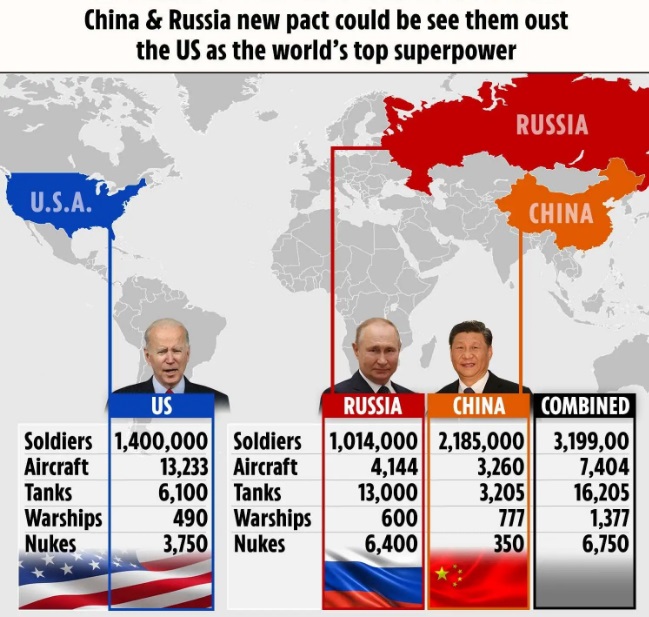 Pic.: thesun.co.uk
Pic.: thesun.co.uk
The marriage of convenience between Moscow and Beijing is a product of American decline, notes James Woudhuysen, a professor of forecasting and innovation at London South Bank University.
The West has been sent into a wild panic by the prospect of a China-Russia alliance. Since Russian president Vladimir Putin brought a large, high-powered delegation to meet Chinese president Xi Jinping in Beijing, the Western media have been suffering from a neurotic spasm.
They claim this new alliance heralds an ‘ominous future’ and marks the ‘start of a second Cold War’. This so-called axis of evil (or ‘unholy alliance’, if you prefer) is ‘converging on a shared purpose of overturning… the prevailing international system’.
Much of this over-excited commentary misunderstands the true nature of the relationship. The China-Russia alliance reflects the collapse of the West’s favoured rules-based international order far more than it represents a new dynamic order of its own.
Elsewhere in US foreign policy, cracks are beginning to show. China and Russia have exposed the limits of the US sanctions regime by continuing to circumvent various import bans.
The US military umbrella is not what it used to be. During the Cold War, the question was asked: would an American president be willing to risk New York or Washington or Chicago to save London or Paris or Hamburg? Today one might ask: would a US president really expose Los Angeles or San Francisco to save Taiwan? It appears that Putin and Xi have decided that neither Biden nor even Donald Trump would take that risk. They have concluded that America lacks resolve.
As things stand, the US is a declining power in Asia, not an expansionist one. Equally, China is a regional power in Asia and wants power over its own backyard. Neither side has global ambitions. What drives Biden is staving off decline. And what drives an ascendant Xi is testing American weakness, all in the cause of bringing Taiwan under CCP control.
What matters most to the CCP is not economic growth but regaining sovereignty over Taiwan. That is why, when independence-minded Taiwanese president William Lai was sworn in, China’s Commerce Ministry announced sanctions against several US firms reputedly engaged in ‘arms sales to Taiwan’. Then, a few days later, the CCP’s People’s Liberation Army, plus the Navy and Air Force, began a two-day practice blockade of Taiwan, just to show who’s the boss.
None of this is to say that the China-Russia coalition is nothing more than a shaky marriage of convenience. As the Financial Times points out, this relationship is ‘built to last’, because both leaders see the US as the main threat’.
Still, the truth is that the China-Russia axis is mostly gaining strength thanks to America’s decline.
read more in our Telegram-channel https://t.me/The_International_Affairs

 11:14 30.05.2024 •
11:14 30.05.2024 •






















